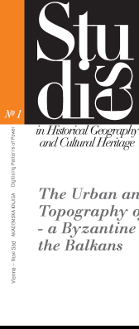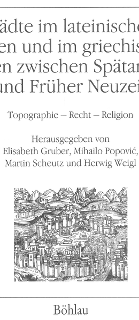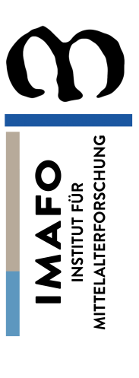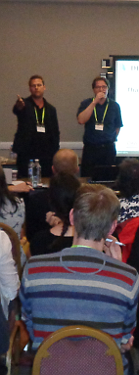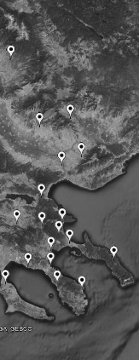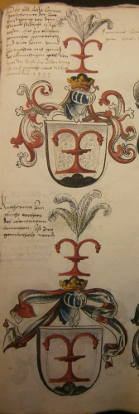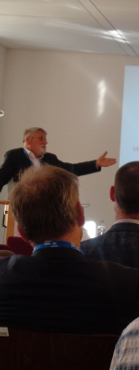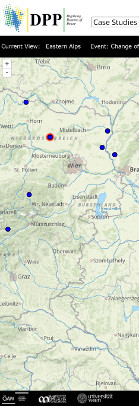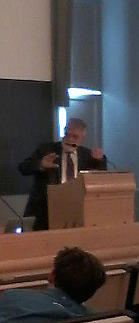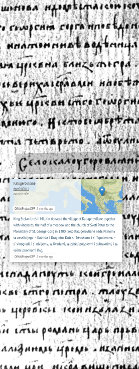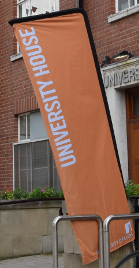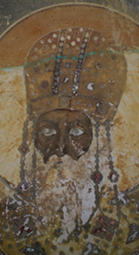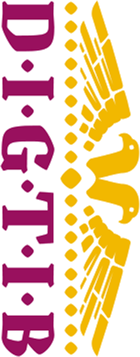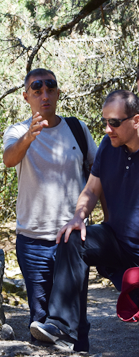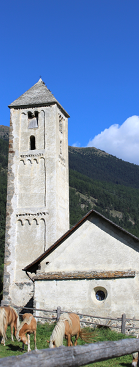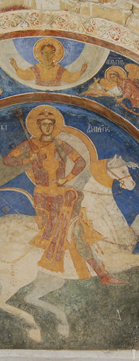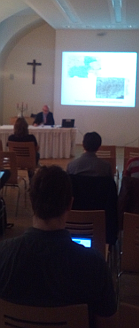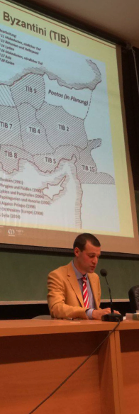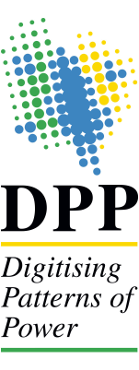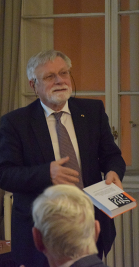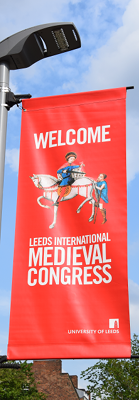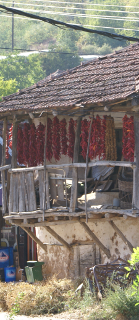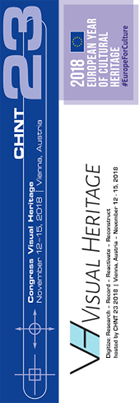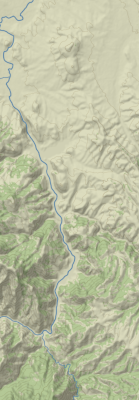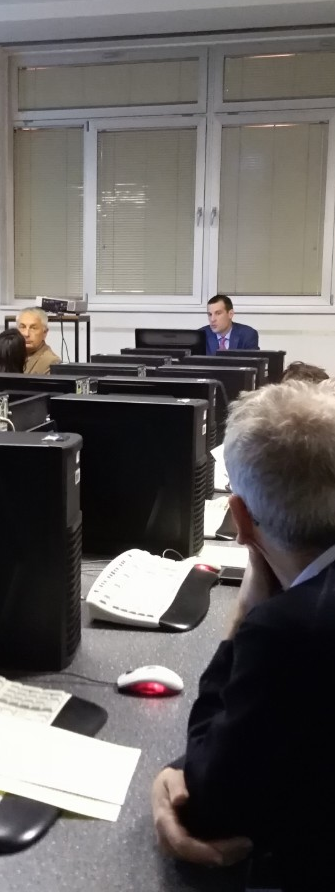|
|
|
|
|
|
|
|

|
Digitising Patterns of Power
Newsletter No.1 / April 2017
|
Dear Ladies and Gentlemen,
Dear Colleagues,
The project "Digitising Patterns of Power (DPP)" has
entered its third year with several new scholarly highlights. In order to communicate results of DPP
and related projects to national and international scholars, students as well as the interested public,
Mihailo Popović has initiated in January 2017 the DPP Lecture Series in Vienna. Following the First
International Workshop of DPP (September 2016), members of the DPP project team, namely Katharina
Winckler, Veronika Polloczek, David Schmid, Bernhard Koschicek and Mihailo Popović, have defined the
project-related term "Sign of Power".
Dr Olivier Delouis (Senior Research Fellow at the CNRS Paris)
and Mihailo Popović have initiated a new scholarly cooperation via the
integration of a new case study within DPP, which is entitled "The Byzantine Region of Bithynia
(4th-15th c.)". Moreover, the Case Study "The Historical Region of Macedonia (12th-14th c.)"
has started a cooperation with the Hilandar Research Library (HRL) of the Ohio State University,
while this Case Study and the one on "The Carolingian Eastern Alps (8/9th c.)" will cooperate
with Recogito of Pelagios in the annotation of Carolingian and Slavonic medieval charters. Finally,
DPP has been granted two sessions at the International Medieval Congress (IMC) 2017 in Leeds.
We wish you Happy Easter holidays!
Yours sincerely,
the DPP team
|
|
|
|
|
|
|
|
DPP Lecture Series established
in Vienna
|

|
In order to communicate scholarly results of DPP and related projects to national and international
scholars, students as well as the interested public, Mihailo Popović has initiated in January
2017 the DPP Lecture Series
in Vienna, which will take place quarterly each year. Our aim is to invite speakers, the papers of
which have the potential to foster discussions on new methods and digital tools in the academic fields
of Medieval History, Byzantine Studies, Historical Geography, Archaeology, Geography, Cartography, Geographical
Information Science (GISc) and Software Engineering.
The first Lecture
entitled "The Ways towards the Complex Study of Settlement Structures: The Case Study of the Early
Medieval Morava Valley" was given by Mag. Jakub Tamaškovič (Constantine the Philosopher University, Nitra,
Slovak Republic). He spoke on the valley of the river Morava between the Carpathian mountain chains
(today’s Slovak Republic) and the first highlands of the Alps (Austria) as well as the methodological
tool of the Geographical Information Systems (GIS) and multiple statistic methods, which are used in
order to understand the relationship between the various types of settlements as well as between the
settlements and their environment.
|
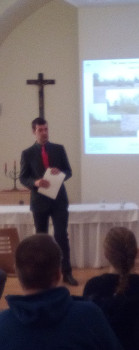
|
|
The second Lecture entitled "Die justinianische Stadtgründung Caričin Grad / Iustiniana Prima – eine
'öko-archäologische' Perspektive" will be presented by Priv.-Doz. Dr. habil. Rainer Schreg
(Römisch-Germanisches Zentralmuseum – RGZM, Leibniz-Forschungsinstitut für Archäologie, Mainz)
on 24 May 2017 in the Seminar Rooms (1_49 and 1_50) on the first floor of the ÖAW building Hollandstraße 11-13.
The DPP Lecture Series is organised in cooperation with the Long-Term-Project "Tabula Imperii Byzantini
(TIB)" of the Austrian Academy of Sciences, which can be found via the following new homepage:
http://tib.oeaw.ac.at/, and with the
Austrian Archaeological Institute.
|
|
|
|
|
|
|
|
Mapping the French Surveys
of Bithynia Online
|

|
It is with great pleasure that we would like to announce the beginning of a new scholarly cooperation via the
integration of a new case study within DPP, which was negotiated and accomplished by
Dr Olivier Delouis
(Senior Research Fellow at the CNRS Paris) and Mihailo Popović (Principal Investigator DPP).
The new case study is entitled
"The Byzantine Region of Bithynia (4th-15th c.)".
Two French research programs have focused on the Byzantine region of Bithynia (Turkey), which
extends from the southern shore of the Marmara Sea to Mount Olympus (Uludağ), and from the lake of
Apollonias to the Sangarios river. Jacques Lefort (École pratique des hautes études, Paris) and Bernard
Geyer (Maison de l’Orient et de la Méditerranée, Lyon) initiated the first program in 1987. They studied and surveyed
Bithynia from 1987 until 1994. As one of the findings of this outstanding body of work, nearly 1,000 photographs,
video recordings, and studies on written sources have been archived in Paris. Marie-France Auzépy
(Université Paris VIII Vincennes Saint-Denis) supervised a second program from 2004 until 2009.
|
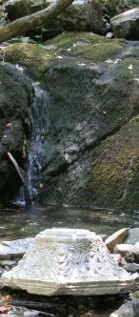
|
|
|
The online publication of the French surveys of Bithynia was made possible by the cooperation of the Laboratory of
excellence (Labex) RESMED (Religions and Societies in the Mediterranean World, Sorbonne University, Paris),
the National Centre for Scientific Research (CNRS, UMR 8167 Orient et Méditerranée, Paris) and the
Austrian Academy of Sciences (Vienna).
The French project and case study is directed by Olivier Delouis,
while Julien Curie, a
trained geographer, is a postdoctoral fellow working for the project at the Labex RESMED. As Principal Investigator of DPP I am
really looking forward to this new cooperation, which will be fruitful and groundbreaking for both partners,
for the sustainable documentation of the World’s Cultural Heritage as well as for the analysis of Byzantine
Patterns of Power in this part of Asia Minor.
|
|
|
|
|
|
|
|
Save the Date – IMC Leeds, 3-6 July 2017
|

|
We are very much looking forward to one of our scholarly highlights in the year 2017. Our DPP team had
submitted two sessions to the International Medieval Congress (IMC) in Leeds during autumn 2016, which
have both been accepted by the organisers in the meantime.
They will take place on Monday, 3 July 2017, from 2:15 p.m. until 6 p.m. in the Leeds University Union
Room 4 – Hyde Park (Session Numbers 239 and 339).
Our sessions are entitled as follows:
Session Digitising Patterns of Power I – Genealogy on a Map (chair: Prof. Dr. Rosamond McKitterick, Sidney Sussex College, University of Cambridge)
Session Digitising Patterns of Power II – Borders, Power, and the Other (chair: Prof. Dr. Charlotte Roueché, King’s College London, University of London)
|
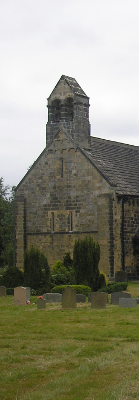
|
|
After presenting the aims and research of DPP at the IMC Leeds in 2016, we will take the opportunity
in 2017 to provide an insight in our new research results and established methodology. Our papers will
address, amongst others, new map features of the DPP OpenAtlas web interface, the prototype of the map
based online application, which will be the prominent frontend of the DPP project, and the so-called
"Signs of Power", which are one of the most important aspects of the joint research work in 2016/17
within the DPP OpenAtlas Database. These "Signs of Power" are intended to serve as a designation for
special places, in which rulers, or persons empowered by them, exercised and / or represented symbolic,
but also concrete power.
We will inform you in detail on our papers at the IMC Leeds 2017 in our second DPP Newsletter in June
this year. For the time being, please feel free to consult the homepage of the organisers of the IMC
Leeds 2017:
http://www.leeds.ac.uk/ims/imc/imc2017.html
|
|
|
|
|
|
|
|
DPP cooperates with the
Ohio State University and Pelagios
|

|
In the spring of 2017 Mihailo Popović has accomplished two new scholarly cooperations, firstly with the
Hilandar Research Library (HRL)
of the Ohio State University and secondly with the project Pelagios.
Thus, the aim to digitise / scan selected manuscripts (i.e. Carolingian and Serbian charters), as
outlined in the project proposal of DPP, will be implemented. This very approach will be fulfilled by
the two case studies "The Agilolfingian and Carolingian Eastern Alps (8/9th c.)" and "The Historical
Region of Macedonia (12th-14th c.)".
|
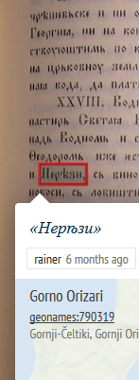
|
|
In the case of the historical region of Macedonia the scans of the first charter to be evaluated will be
provided generously by the aforesaid Hilandar Research Library (HRL), which shall lead to a sustainable
continuation of the synergy in the near future. This first example is the charter given to the Monastery
of Saint George-Gorg near Skopje by the Serbian king Milutin in the year 1300 (HRL, SPEC.HM.SDS.132 and 133).
Its scan will be annotated with the help of the software Recogito,
which was developed by Pelagios. Thus, places in the charter can be linked to the respective entry
in the DPP OpenAtlas Database or to the respective places in the Map-Based DPP Application. This confined
case study of annotation will be presented, amongst others, by
Dr Rainer Simon (Austrian Institute of Technology),
one of the software developers of Recogito, at the IMC Leeds 2017.
These determined steps will create a “best practice” in this area of research and contribute to
endeavours which are an important aspect of the contemporary research agenda.
|
|
|
|
|
|
|
|
Signs of Power
|

|
One of the most important aspects of DPP’s research work are the so-called "Signs of Power". These
are intended to serve as a designation for places, in which rulers, or persons empowered by them,
exercised and/or represented symbolic, but also concrete power.
Therefore, members of the DPP project team, namely Katharina Winckler, Veronika Polloczek, David Schmid,
Bernhard Koschicek and Mihailo Popović, defined the respective term "Sign of Power", which was given
preference over the term "Symbol of Power", since the English word "Symbol" was seen as a concept, which
mainly encompasses intangibles, and, therefore, was deemed too narrow for addressing the analysis of the
description of space in written sources, the interactions between natural and cultural space and the
rise of power.
A type tree for the "Sign of Power" was developed by the aforesaid scholars at the end of 2016 and has
already been implemented in the DPP OpenAtlas Database. The "Signs of Power" will only be tagged within
the entity "Places" and are divided into four large groups, political, economic, cultic and military,
which are again subdivided.
For further information please visit the "Sign
of Power" section on our website or consult the upcoming Journal
"Medieval Worlds Volume 5. 2017", which will be available in July 2017.
|
|
|
|
|
|
|
|
|
|
|





























